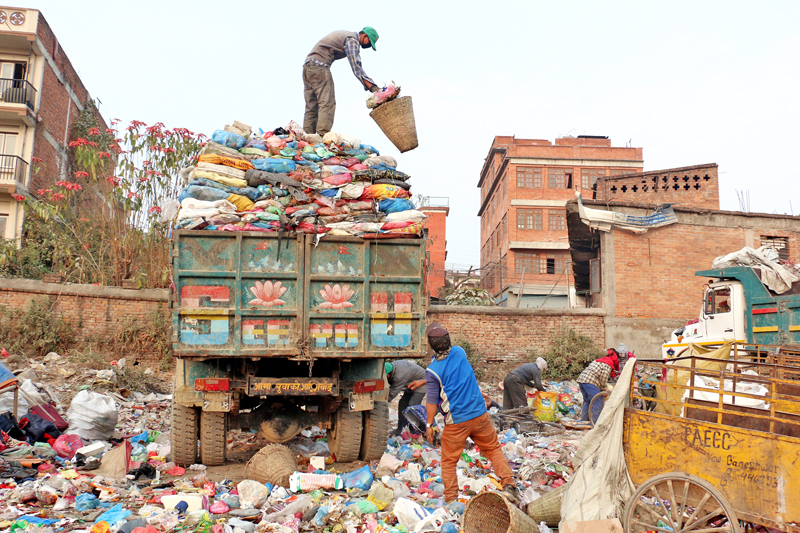Kathmandu metropolis fails to address garbage woes amid COVID-19 scare
Kathmandu, March 25
Piles of garbage on roadsides and at intersections across Kathmandu have started accumulating as life in capital city comes to a standstill due to week-long nationwide lockdown.
The lockdown imposed by the government as preventive measure against spread of the coronavirus, is applicable to all sectors except those that provide essential services.
Waste management falls under one of 19 areas of essential services designated by the government. However, Kathmandu Metropolitan City has failed to prioritise waste management and environmental sanitation. COVID-19 is transmitted through contaminated surfaces.
The coronavirus outbreak has badly affected waste management in the metropolis as sanitation workers face increased risk of being infected with the disease. Waste piled up at thoroughfares has posed serious heath threats to the public.
Though KMC claimed waste management activities would continue daily amid the coronavirus scare, it has yet to be implemented in practice. KMC Mayor Bidya Sundar Shakya claimed that the metropolis had stepped up its efforts to prevent the spread of coronavirus through more effective waste management.
“We have started washing and disinfecting the streets. We are serious about cleanliness and have been clearing the roads of trash,” he said.
Mayor Shakya also appealed to the city denizens to cooperate with KMC for waste management.
“I request the public to manage household waste by themselves as far as possible. We are doing all possible to collect and dispose of the garbage, which cannot be managed at home,” he said, urging denizens not to haphazardly dispose of wastes generated from their homes on the street.
According to KMC, sanitation workers with personal protective equipment were mobilised due to fear of exposure to infection.
Some of the sanitation workers were scared to continue with their regular work due to social distancing requirement in the wake of the disease outbreak.
Lack of coordinated transportation system was one of the major hurdles for valley waste management, said a source at KMC.
The waste collected from 18 local levels in Kathmandu valley has been dumped at Sisdol Landfill Site in Nuwakot for the past 13 years. Around 1,000 metric tonnes of waste is generated in the valley on a daily basis.
KMC alone generates 500 metric tonnes of waste on a daily basis.
Around 35 private organisations working inside the metropolis collect waste from door-todoor and manage them at the landfill site. Those organisations collect more than 80 to 100 trucks of waste before transporting them to the site.






